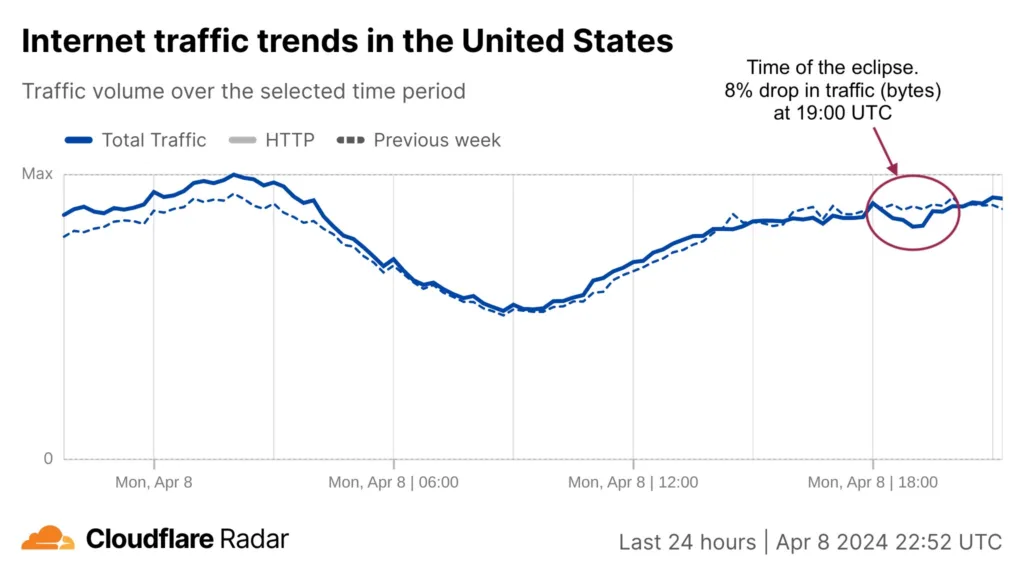
Solar eclipse wipes out internet traffic
Not because the internet fell over, but because everyone looked up at the same time
The eclipse that blotted out most of the sun across North America yesterday didn’t herald an apocalypse — though it did wipe out internet traffic.
We now know what will get people off their smartphones and away from streaming TV: photogenic astronomical events. Yesterday evening, a total solar eclipse was visible across Mexico, the US and Canada, with the moon blocking the light from the sun in some locations — the first since similar events in 2017 and 1971 before that.
Networking company Cloudflare revealed that the Great North American Eclipse, as it’s apparently been dubbed, led to a noticeable dip in US internet traffic. Across the country, delivered traffic was down by 8% and requested traffic fell by 12% at 19:00 UTC (about the time of the eclipse) versus the same time last week.
Read this! Three technologies making critical infrastructure vulnerable to DDoS attacks
Massive dips in internet usage
That might not sound like much when it comes to web use, but the eclipse wasn’t visible in all states — and those that could see it clearly had crowds of people standing on their front lawns looking up rather than at Netflix.
According to Cloudflare, at the time of the eclipse locally, Vermont saw a 60% decrease in traffic versus the previous week, while Arkansas, Indiana and Maine all saw internet use halve — that’s particularly significant given 30% of traffic has been attributed to bots rather than humans. New Hampshire and Ohio both saw dips of 40%. “These states were all in the path of totality, which was not the case for several others,” noted Cloudflare in a blog post.
Indeed, Kentucky, Massachusetts and Michigan fell by a third, and a further dozen saw slips of around a quarter. Some states saw no difference, but they were in areas where the eclipse wasn’t visible.
Regions of Mexico that could see the total solar eclipse also saw a fall in internet traffic, with Durango dipping 57% and Coahuila falling 43%. In Canada, the biggest drop off was the tiny provincial province of Prince Edward Island, which saw internet traffic nosedive by 48%.

How does the change compare?
How does the solar eclipse compare to other internet dips? Easter saw some of the lowest traffic days for celebrating nations, with Poland down by 22%, Italy by 18% and France by 16%, according to Cloudfare — with a 38% fall in internet traffic in Italy during Easter Sunday lunch. Traffic also fell 23% during the daytime in Turkey as it celebrated Ramadan, with web use leaping 74% first thing in the morning before fasting begins.
Though bots do have an impact online, Cloudfare says these dips and leaps show the internet is still reflective of our human habits: “It could be Easter, Passover or Ramadan, those traditions change Internet traffic patterns in several countries on Earth, simply because the Internet was made by and for humans, and is used by us every day.”
North Americans who were too busy watching streaming TV or staring at their smartphones and missed the celestial event will have to wait until 2044 for the next solar eclipse in the region — or just relive it via the photos that flooded social media in the aftermath.
NEXT UP

James McQuiggan, Security Awareness Advocate at KnowBe4: “Ironically, attack methods have remained unchanged over the past twenty years”
In this interview, we hear from James McQuiggan, Security Awareness Advocate at KnowBe4 and a part-time Faculty Professor at Valencia College in Florida.

What is ocean-bound plastic and should you care?
Lee Grant digs behind the truth about ocean-bound plastics to explain why reducing them is a worthy cause – but that we need to treat marketing claims with due scepticism

Slow buyers cause tech firms to rethink sales approaches as tough Q1 hits home
New research suggests tech sales were slow in Q1, with buyers of technology and professional services taking their time before committing to any solutions.
